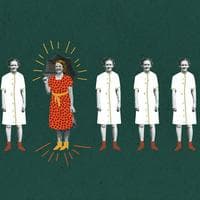{{ชื่อ}} ประเภทบุคลิกภาพ MBTI
บุคลิกภาพ
"Jean-Baptiste Grenouille ประเภทบุคลิกภาพประเภทใด Jean-Baptiste Grenouille เป็นประเภทบุคลิกภาพ ISTP ใน mbti, 5w4 - SX5 - 594 ใน Enneagram, ใน Big 5, SLI ใน Socionics"
I'm convinced this is the Five's blueprint. Read the book, it's an outstandingly detailed portrait of how a sx5's unregulated psyche could manifest in raw conduct towards it's environment and those around him. Almost eerie how much it seems like a description of this type. Here are some quotes to get the idea. ——— "Grenouille knew for certain that unless he possessed this scent, his life would have no meaning. He had to understand its smallest detail, to follow it to its last delicate tendril; the mere memory, however complex, was not enough. He wanted to press, to emboss this apotheosis of scent on his black, muddled soul, meticulously to explore it and from this point on, to think, to live, to smell only according to the innermost structures of its magic formula." "He was as tough as a resistant bacterium and as content as a tick sitting quietly on a tree and living off a tiny drop of blood plundered years before. He required a minimum ration of food and clothing for his body. For his soul he required nothing. Security, attention, tenderness, love-or whatever all those things are called that children are said to require were totally dispensable for the young Grenouille. Or rather, so it seems to us, he had totally dispensed with them just to go on living-from the very start. The cry that followed his birth, the cry with which he had brought himself to people's attention and his mother to the gallows, was not an instinctive cry for sympathy and love. That cry, emitted upon careful consideration, one might almost say upon mature consideration, was the newborn's decision against love and nevertheless for life. Under the circumstances, the latter was possible only without the former, and had the child demanded both, it would doubtless have abruptly come to a grisly end. Of course, it could have grabbed the other possibility open to it and held its peace and thus have chosen the path from birth to death without a detour by way of life, sparing itself and the world a great deal of mischief. But to have made such a modest exit would have demanded a modicum of native civility, and that Grenouille did not possess. He was an abomination from the start. He decided in favor of life out of sheer spite and sheer malice." "Grenouille suffered agonies. For the first time, it was not just that his greedy nature was offended, but his very heart ached. He had the prescience of something extraordinary-this scent was the key for ordering all odors, one could understand nothing about odors if one did not understand this one scent, and his whole life would be bungled, if he, Grenouille, did not succeed in possessing it. He had to have it, not simply in order to possess it, but for his heart to be at peace." "He was almost sick with excitement. He had not yet even figured out what direction the scent was coming from. Sometimes there were intervals of several minutes before a shred was again wafted his way, and each time he was overcome by the horrible anxiety that he had lost it forever. He was finally rescued by a desperate conviction that the scent was coming from the other bank of the river, from somewhere to the southeast" "Go out on weekend evenings for an hour after work and do whatever he liked. He had triumphed, for he was alive, and he possessed a small quantum of freedom sufficient for survival. The days of his hibernation were over. Grenouille the tick stirred again. He caught the scent of morning. He was seized with an urge to hunt. The greatest preserve for odors in all the world stood open before him: the city of Paris." "He had closed his eyes and did not stir. He saw nothing, he heard nothing, he felt nothing. He only smelled the aroma of the wood rising up around him to be captured under the bonnet of the eaves. He drank in the aroma, he drowned in it, impregnating himself through his innermost pores, until he became wood himself; he lay on the cord of wood like a wooden puppet, like Pinocchio, as if dead, until after a long while, perhaps a half hour or more, he gagged up the word "wood." He vomited the word up, as if he were filled with wood to his ears, as if buried in wood to his neck, as if his stomach, his gorge, his nose were spilling over with wood. And that brought him to himself, rescued him only moments before the overpowering presence of the wood, its aroma, was about to suffocate him. He shook himself, slid down off the logs, and tottered away as if on wooden legs. Days later he was still completely fuddled by the intense olfactory experience, and whenever the memory of it rose up too powerfully within him he would mutter imploringly, over and over, "wood, wood."





















